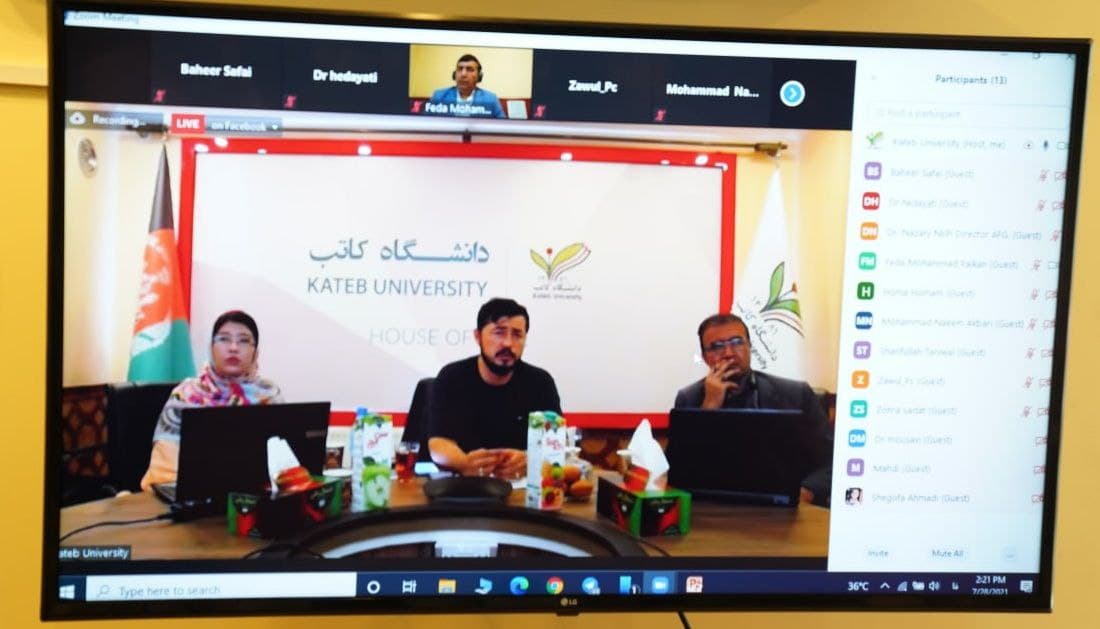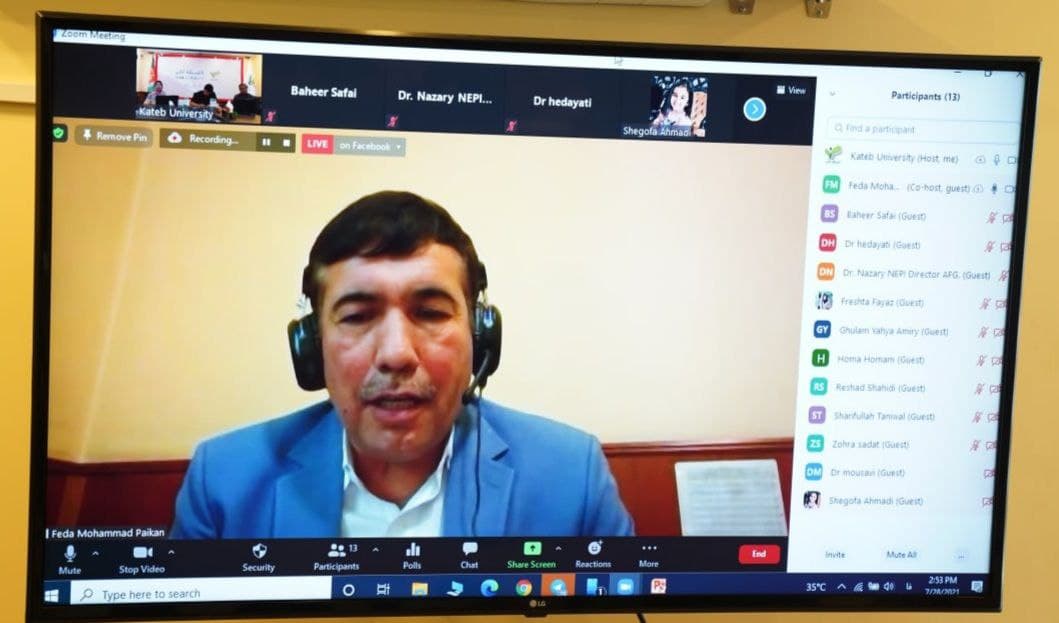On July 28 (World Hepatitis Day), scientific webinar entitled “Hepatitis and its Challenges in Afghanistan” was held by Kateb Research Center in collaboration with Kateb Medicine Faculty. This webinar was held through Zoom Conferencing Software and was streamed live on Kateb Facebook Page.
This webinar was attended by presenters from government agencies and health NGOs. The webinar began with a speech by Dr. Sayed Hamid Mousavi, Director of Kateb Research Center. He introduced the presenters of the webinar.
Then, Dr. Sayed Moeed Alawiyan, Professor of Hepatology and university lecturer, provided valuable explanations about the burden of hepatitis B and C in the region and expertly presented the solutions and challenges in the diagnosis, treatment and prevention of these diseases. Dr. Alawiyan expressed his interest in signing MoUs between universities and scientific centers. He said that with the right strategies, we can eradicate hepatitis C in Afghanistan and with drugs that have been developed in recent years to treat hepatitis C, the disease can be treated at very low cost. He also considered the issue of hepatitis B vaccination very important and said that hepatitis B vaccination should be one of the priorities programs of the Ministry of Public Health of Afghanistan.
Following the webinar, Dr. Najm Al-Sama Shafajou, Obstetrician and Gynecologist and Chair of the Afghan Obstetric and Gynecological Association, presented a comprehensive presentation on the problems of staff and obstetricians in dealing with hepatitis patients. He cited the fact that pregnant women are infected with hepatitis B and C as one of the most important challenges, and said that unfortunately the problems of vaccine and immunoglobulin deficiency have led to the birth of children with hepatitis, especially in the provinces
Dr. Hamideh Fassihi, a lecturer at Kateb University, said that the COVID-19 pandemic is a challenging period for all countries of the world in all aspects of public health services. According to World Hepatitis Day, one of the issues discussed in this pandemic is the effects of Covid 19 on liver diseases, including hepatitis, are discussed. SARS COV2 virus, after binding to ACE-2 receptors on the surface of all cells in the body, especially in the respiratory, gastrointestinal, liver, and urinary systems, can cause liver damage or destructive effects on liver tissue already affected by hepatitis. Destructive effect directly after the virus binds to the liver cells, inflammatory process due to activation of the immune system and production of inflammatory markers, congestion caused by destruction of hepatic vascular endothelium, lack of effective proteins in coagulation and immunity due to destruction of liver cells, and the effects of the drugs used to treat COVID-19 can all damage a healthy liver or cause hepatitis. But what is important and troubling during the COVID-19 pandemic is the cessation of hepatitis control programs and strategies around the world. According to epidemiological and statistical research and analysis, failure to compensate for the one-year delay in the management and control strategies of hepatitis, especially hepatitis C, during the COVID-19 period can lead to 906,000 cases not being diagnosed and 746,000 not being treated. Therefore, the implementation of new strategies for screening and diagnosis of cases should be adopted globally and urgently. One of the proposed strategies is to screen the entire adult population for hepatitis at once, which according to research will be cost-effective. Other strategies include raising awareness, increasing access to hepatitis screening and control services, increasing relevant campaigns, facilitating laboratory tests, increasing access to drugs and hepatitis vaccines, and completing COVID 19 vaccination to end a pandemic and resume control strategies.


In addition, Dr. Dastgir Nazari, Spokesman of the Ministry of Public Health and Head of the Ministry of Public Health, gave a speech entitled “Effect of Hepatitis B Birth dose on getting immunity against Hepatitis B” about the importance of hepatitis B vaccination. He said that to date, more than 46 percent of children in Afghanistan have been covered by the vaccine, noting that we are looking to increase the level of this vaccine in other programs.
In the continuation of the webinar, Dr. Sayed Mohammad Reza Hosseini considered the need to implement preventive strategies in reducing and controlling the hepatitis epidemic ineffective and one of the effective strategies is to implement a vaccination program for the whole community, especially newborns during the first 24 hours of Positive HBSAg. Implementation of screening programs for groups at risk of hepatitis B, including drug addicts, pregnant women, prisoners, medical opacities, dialysis, blood donors and organ transplants, etc. were considered effective. In this strategy, it is very effective in increasing the level of knowledge and awareness of the whole community by holding awareness campaigns on hepatitis through medical staff, elders and influential people. Finally, the existence of a comprehensive database system at the provincial level to collect statistics on hepatitis B patients will play an effective role in planning and effective interventions to reduce the number of cases.
Furthermore, Dr. Sayed Hamid Mousavi, Director of Research Center at the Kateb University, pointed out the problems in the blood bank and the lack of proper screening of blood donors in the blood bank, as well as the lack of vaccination of certain patients such as hemophilia and thalassemia due to their use of blood and blood products. Dr. Mousavi pointed out that universities and research centers can play an effective role in informing these diseases in the community and further said that the role of universities in cooperating with the Ministry of Public Health in various dimensions can be very constructive and effective. Especially in the field of scientific research the Ministry of Public Health should provide its databases such as HIS to researchers in universities to play an important role in the planning and macro policies of the Ministry of Public Health by conducting various scientific studies on these databases and analyzing them.
At the end of the webinar, Dr. Feda Mohammad Paikan gave valuable explanations about the statistics of hepatitis patients and general information about this disease in the country and shared their valuable experiences in the period that determined the provision of health services. At the end of the webinar, interested people from inside and outside the country asked questions related to hepatitis, and the experts gave the necessary answers to the participants.
Sharing: